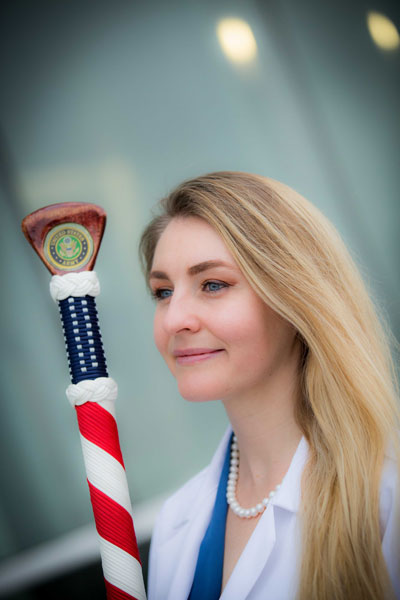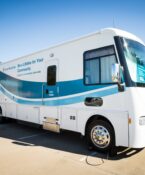UNTHSC students have proud tradition of military service
By Alex Branch
In a remote U.S. Army military outpost in Liberia, Andi Toufexis wore a hooded Tyvek protection suit, two layers of gloves and a breathing apparatus strapped to her back.
The farm girl from southeast Texas meticulously tested blood samples collected from deceased Liberians for one of the most feared diseases of all — Ebola virus.
For a 26-year-old Army medical laboratory technician, the 2014 experience was exciting and daunting.
“I got my first positive Ebola result and my mind started racing a bit back through all the steps I had taken — did I do this right, did I put that on the right way?” Toufexis said. “But the truth is there so many protective steps you take that even getting one wrong isn’t enough to put yourself in danger. You’d have to do several wrong.”
Four years after that humanitarian mission, Toufexis is building on the skills she learned in the military as a first-year medical student at UNT Health Science Center’s Texas College of Osteopathic Medicine. She is one of at least 65 veterans at the university studying to become health care providers of the future.
UNTHSC was dedicated last year as a Purple Heart University, an honor given by the Military Order of the Purple Heart DFW Mid-Cities Chapter #1513 in recognition of a university’s support of military members, including veterans and their families.
Toufexis grew up on a farm in Groveton, a small town of just more than 1,000 people. Surrounded by pigs, cows and horses, she originally planned to be a veterinarian after serving in the Army. But working alongside military doctors and participating in the response to the 2014 Ebola outbreak, she realized she wanted to help people.
Benefits and resourcesLearn more about benefits and resources available to active, reserve or veteran service members at UNTHSC. |
She knew nothing at the time about osteopathic medicine. Working with a DO at Walter Reed National Military Medical Center exposed her to the holistic style of care. It was the first time she had osteopathic manipulative medicine, which are hands-on maneuvers to diagnose, treat, and prevent illness or injury.
“The care the doctors were providing had such a drastic effect on patients,” Toufexis said. “It upended what my impression of medicine had been, which was ‘Well, my blood pressure is high so I better get a pill.’ It was inspiring.”
At UNTHSC, she found a supportive community of staff, faculty and students. She helps train students to apply tourniquets as part the university’s participation in Stop the Bleed, a U.S. Department of Homeland Security national awareness campaign to prevent bleeding deaths.
“These are skills we learn in the military,” Toufexis said. “It’s nice to put them to use here.”

![Uyen Sa Nguyen Scaled[58]](https://www.unthsc.edu/newsroom/wp-content/uploads/sites/16/Uyen-Sa-Nguyen-scaled58-145x175.jpg)



Social media